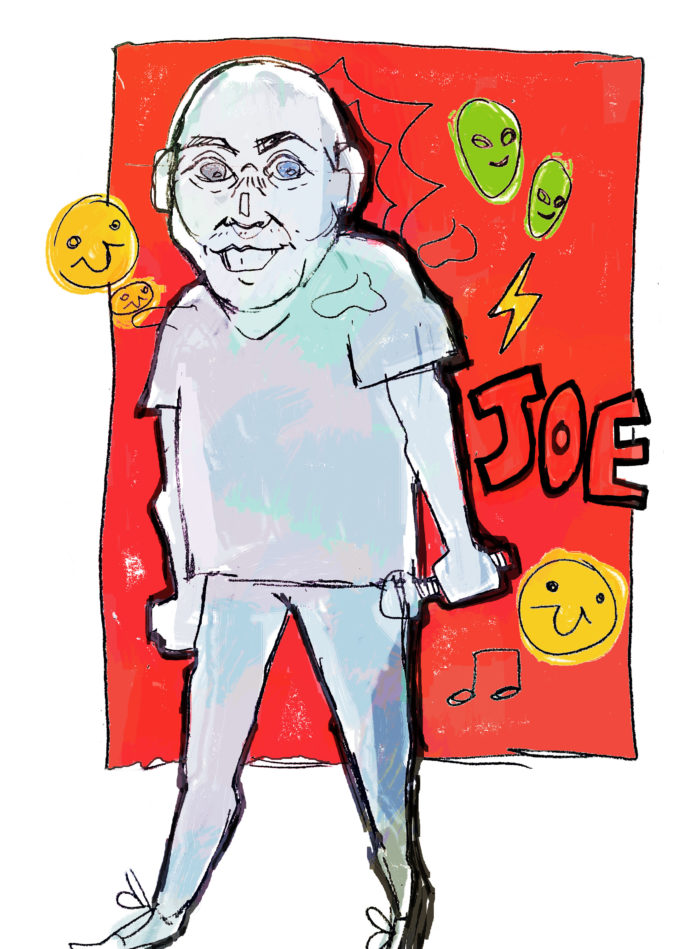Joe Rogan, most famous now as the host of the Joe Rogan Experience podcast, has had a wide and varied career. He began work as a comedian, switched to mixed martial arts commentary, hosted a TV show (Fear Factor) and now hosts his own podcast. Rogan is distinguishable from other podcast hosts by his remarkable affability — he has a playful-yet-tough personality, a strange obsession with the psychedelic drug DMT and a passion for Brazilian jiu-jitsu, among several other quirks.
Rogan is also an adamant free speech advocate. Free speech, as defined by the First Amendment, consists of, but is not limited to: speech critical of the government and other public institutions, critique of public figures, anonymous speech, political propaganda and offensive speech. Since the start of his podcast in 2009, Rogan has engaged in or promoted almost every one of the above forms of speech. He isn’t afraid to put his guests on the spot if he disagrees with their views, but he is equally willing to listen to them, especially if they bring reasonable arguments to the table. This is why many of my fellow listeners and I admire him.
Rogan’s most commendable trait is his ability to foster productive conversation. In an era where mainstream media journalists have repeatedly come under attack for their portrayal of certain issues, as with the case of CNN reporter Jim Acosta’s beef with the president, smaller platforms such as Rogan’s will play a larger role in promoting civil discussion and factual accuracy.
Case in point — presidential candidate Andrew Yang. Many people have pointed out the disparity between Yang’s popular appeal and the amount of coverage he gets in the media. However, Yang was able to find a platform on The Joe Rogan Experience, which considerably increased his public exposure. The podcasts Yang appeared on are small-scale, interactive and lengthy which allows listeners to get a far more intimate look at him than they would be able to if they relied upon his debates and mainstream coverage alone.
Rogan shares another thing with his fellow podcast hosts: he has come under fire for hosting controversial public figures, such as far-right conspiracy theorist Alex Jones, flat-earther Eddie Bravo and white nationalist Stefan Molyneux.
In many of my discussions with friends and strangers about whether or not de-platforming controversial political figures is a good idea, those who are in favor of tighter restrictions almost always comment that extreme ideologues create political division. One example that I hear frequently is Trump’s rhetoric about not wanting immigrants from “shithole countries” to come to the United States. Most of the people who critique Trump for divisiveness seem to forget that politics is by its very nature divisive, and that hate has and always will find a voice.
Liberals, conservatives and radicals alike have told me time and time again that administrative bodies should censor hate speech, that it has no place in a civil society and that those who support it should have restrictions applied on their platforms. But on this count, I wholeheartedly defend Rogan’s right to host whomever he wishes, because it is important to give a platform to people who espouse morally reprehensible views. Only in an open, democratic arena such as YouTube, where practically anyone with a camera and computer has the capacity to air their thoughts on societal issues, can moral ideas triumph over immoral ones. Rogan’s podcast also succeeded in this respect — by bringing conspiracy theorist Alex Jones on at a time when most media outlets refused to give him a platform, Rogan brought more attention to one of Jones’ depraved conspiracy theories, which most right-wing sources glossed over.
A high number of dislikes on a YouTube video by Huffington Post covering that same conspiracy theory is another indicator of why exposure to hateful speech is necessary. In the comments section of that video, many people sympathized with Jones due to Huffington Post’s excessive use of video cuts, which appeared to censor him. By silencing your opponents, you lend them greater credence, because the public then sees them as victims of repression. And as the late public intellectual Christopher Hitchens once said, “Every time you silence somebody, you make yourself a prisoner of your own action, because you deny yourself the right to hear something.” Rogan seems to recognize these principles, and he is willing to talk to people whose views he may not necessarily share, exposing them in the process for who they truly are — crackpots and cultists.
The free speech debate reminds me of Benjamin Franklin’s response to the crowd outside Independence Hall who asked what the deliberations of the Constitutional Convention had resulted in: “A Republic, if you can keep it.” By this, Franklin implied that we could not stand to breach the principles of free speech and free thought, upon which the United States was founded, lest we descend again into monarchy and tyranny. I do not know if Rogan ever heard Franklin’s saying, but he seems to have internalized the idea behind it. We should all follow his example by exposing ourselves to new opinions and engaging in debate, even if doing so is uncomfortable. That, and tune into his podcast more often.
Anirudh Krishnakumar is an undeclared first year. He can be reached at akrishnakuma@oxy.edu.
![]()































